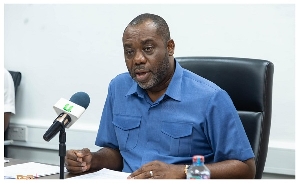Opinions of Saturday, 3 May 2008
Columnist: Kwasi Budu: General Secretary-CPPNA
CPPNA Response To Attack on Dr. Nii Moi Thompson
Although a cherished right of the people, freedom of the press is different from other liberties of the people in that it is both individual and institutional. It applies not just to a single person's right to publish ideas, but also to the right of print and broadcast media to express political views and to cover and publish news. A free press is, therefore, one of the foundations of a democratic society, and as Walter Lippmann, the 20th-century American columnist, wrote, "A free press is not a privilege, but an organic necessity in a great society." Indeed, as society has grown increasingly complex, people rely more and more on newspapers, radio, and television to keep abreast with world news, opinion, and political ideas. One sign of the importance of a free press is that when antidemocratic forces take over a country, their first act is often to muzzle the press.
The origins of freedom of speech and press are nearly alike, because critical utterances about the government, either written or spoken, were subject to punishment under English law. It did not matter whether what had been printed was true; government saw the very fact of the criticism as an evil, since it cast doubt on the integrity and reliability of public officers. Progress toward a truly free press, that is, one in which people could publish their views without fear of government reprisal, was halting, and in the mid-18th century the great English legal commentator, Sir William Blackstone, declared that although liberty of the press was essential to the nature of a free state, it could and should be bounded.
If there is one right prized above all others in a democratic society, it is freedom of speech. The ability to speak one's mind, to challenge the political orthodoxies of the times, to criticize the policies of the government without fear of recrimination by the state is the essential distinction between life in a free country and in a dictatorship. In the pantheon of the rights of the people, Supreme Court Justice Benjamin Cardozo, who served from 1932 to 1938, wrote of free speech that it is "the matrix . . . the indispensable condition of nearly every other freedom."
In the last week in the political maturity of the nation Ghana, most viewers witnessed a horrible incident that need never to be repeated in our onward march towards a nation that respects freedom of speech and the press. It was shocking to the nation to see the storming of a Television station by no less a person than “Honourable” Joe Baidoo-Ansah, on the 24th April 2008 edition of Metro TV’s Good Evening Ghana, towards the CPP’s spokesperson on the economy, Dr. Nii Moi Thompson, who was an invited guest on the program. Honourable Mr. Joe Baidoo-Ansah, who doubles as the Minister of Trade, Industry, Presidential Special Initiatives and Private Sector Development in the current administration of President Kuffour, verbally attacked the invited guest in a fit of rage because he personally did not agree to Mr. Nii Moi’s position on the recent purchases of two presidential jets by the NPP administration.
Mr. Joe Baidoo-Ansah practically broke through security and attacked the guest in front of other guests including a representative of UNCTAD, an organization of which Mr. Joe Baidoo-Ansah has just been appointed to head.
The Minister since used his good offices to bear upon the cancellation of the program the next day. The decision to cancel the program that normally is repeated the day after its broadcast is the clearest statement yet that government has no business trying to censor newspapers or prevent the disclosure of what might prove embarrassing information.
The Minister of Information and the President must step to confront Mr. Joe Baidoo-Ansah for explanation about his behavior that was broadcasted to a worldwide television audience to the embarrassment of the entire nation. Such action by a Minister of State, to take the law into his own hands demands reprimanding by the President, a summary dismissal from his administration to set an example to other members of his government who will entertain the idea that if Joe Baidoo-Ansah has gotten away with this, so can they.
Failure to do so is further proof that President Kuffour, despite his repeated touting of Ghana as witnessing a democratic dispensation that is unprecedented in the history of Ghana under the NPP administration, is a sham.












